Mimouna is a uniquely Moroccan celebration that occurs after Passover. There are several foods that are well known in Morocco and are important for this very festive occasion.
There is no single story as to how Mimouna originated, rather there are several origination stories. The first tales of Mimouna emerged in the mid-18th century. One theory is that it evolved from Muslim neighbors who would bring gifts to their Jewish neighbors at the end of Passover. This makes sense as it was also a tradition that Muslim neighbors would bring flour as soon as Passover was completed.
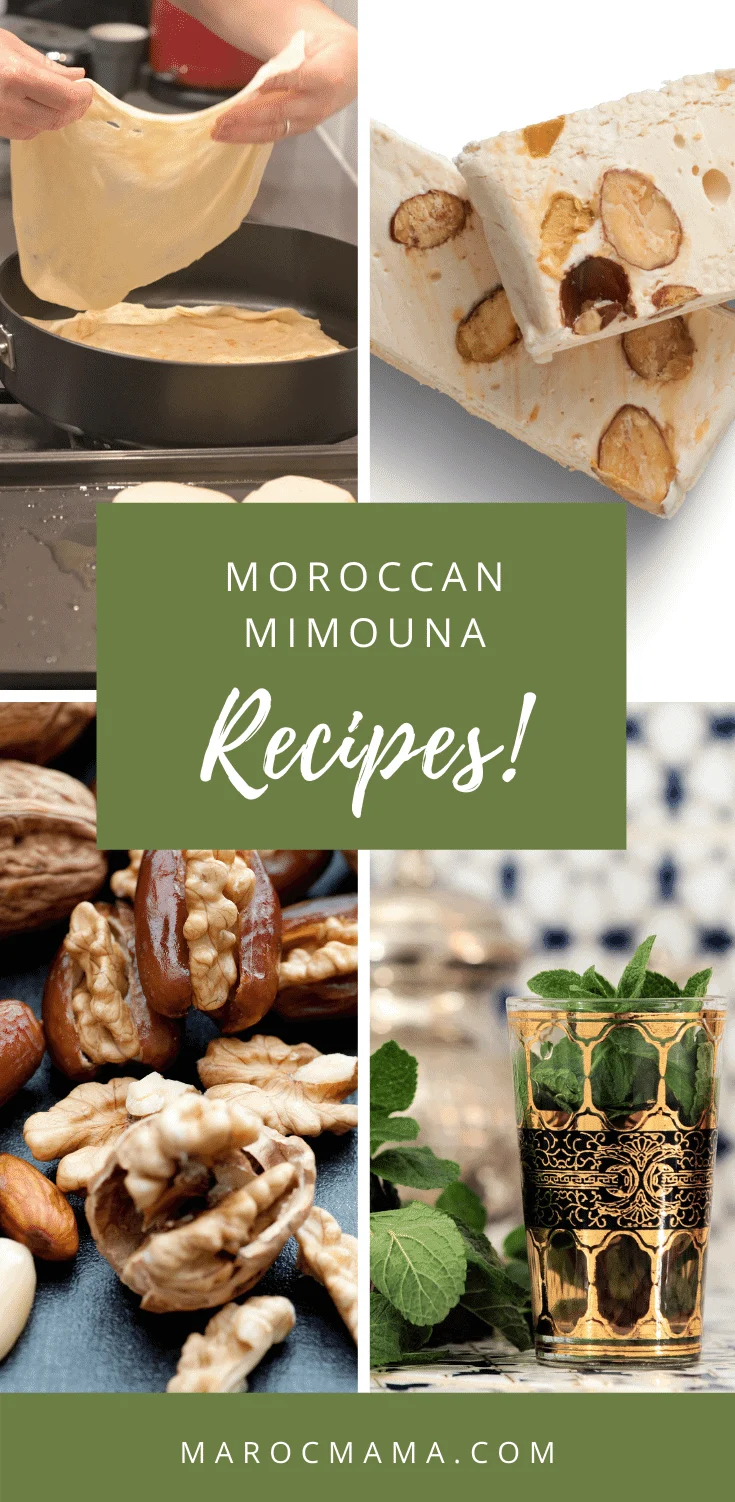
An aspect of Moroccan culture has always been to protect the Jews living there (albeit there definitely were exceptions). In some cities, there were equal amounts of Jews and Muslims living together so it makes sense that their lives would be intertwined in this way. Mimouna was a time of celebration and all neighbors were welcome to visit and celebrate.
I’ve gathered some Moroccan Mimouna recipes for you to try. Mimouna foods are often quite sweet. Many of the items are simple, so that they could be made quickly and put on the table, or do not contain kitniyot items so that they could be made during the Passover holiday before Mimouna. Even if you’re not celebrating Mimouna these are some great recipes for any meal!
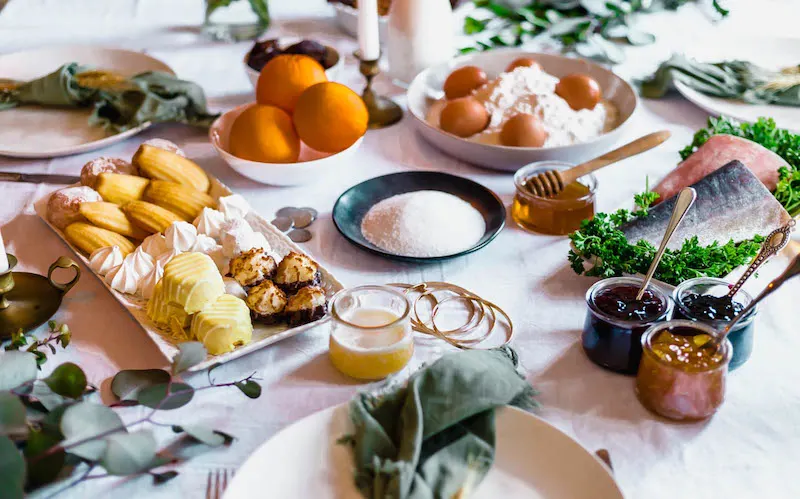
Mimouna Recipe Ideas
These are my own recipes that fit the holiday celebrations. If you’re searching for more, read this post on Sephardic Passover desserts for more inspiration.
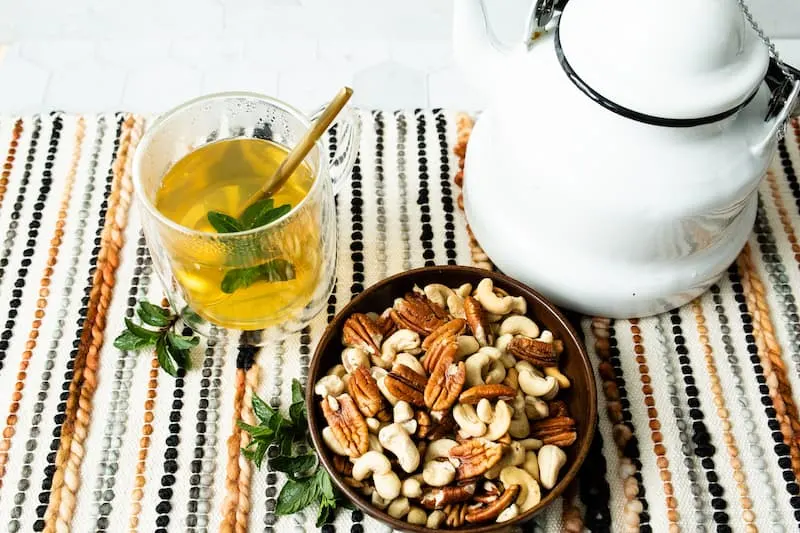
Moroccan Mint Tea – no celebration in Morocco happens without a LOT of mint tea!
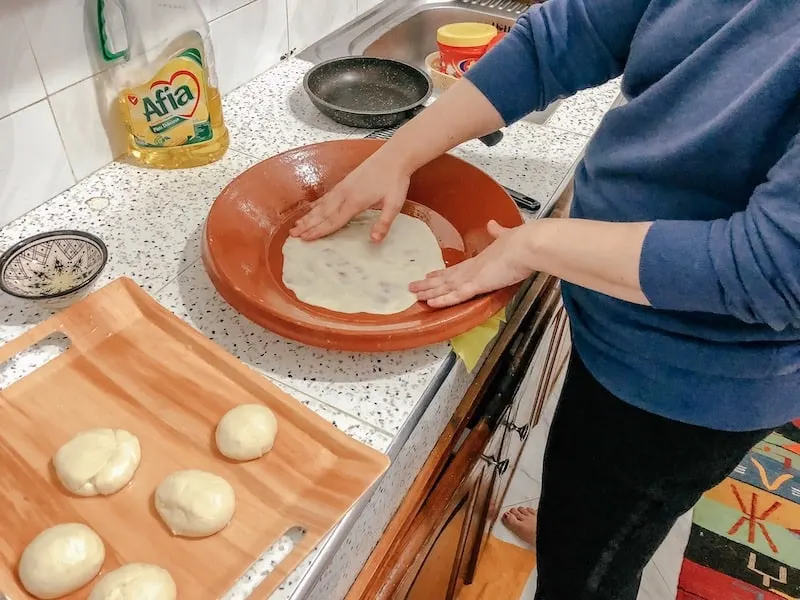
Moroccan Moufleta – Moufleta is a type of crepe made during the Moroccan Jewish holiday of Mimouna.
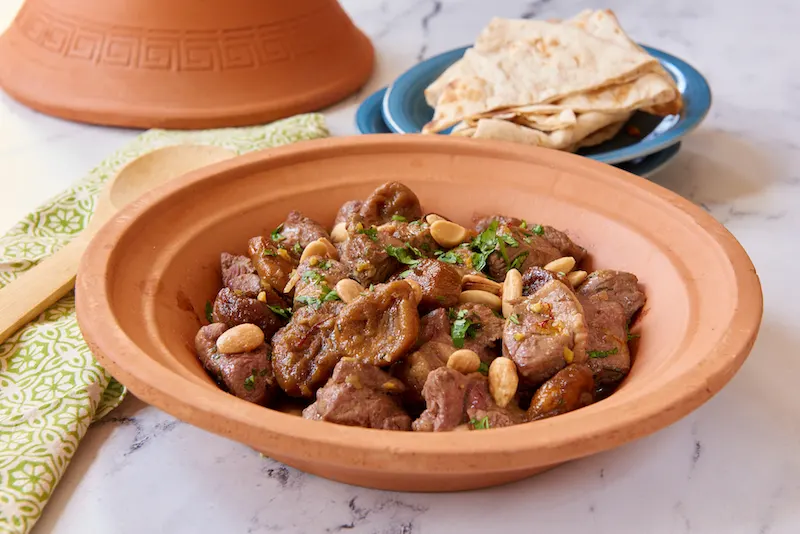
Moroccan Lamb and Fig Tagine – This recipe uses lamb meat and figs creating a savory and sweet dish that’s perfect for a holiday table.
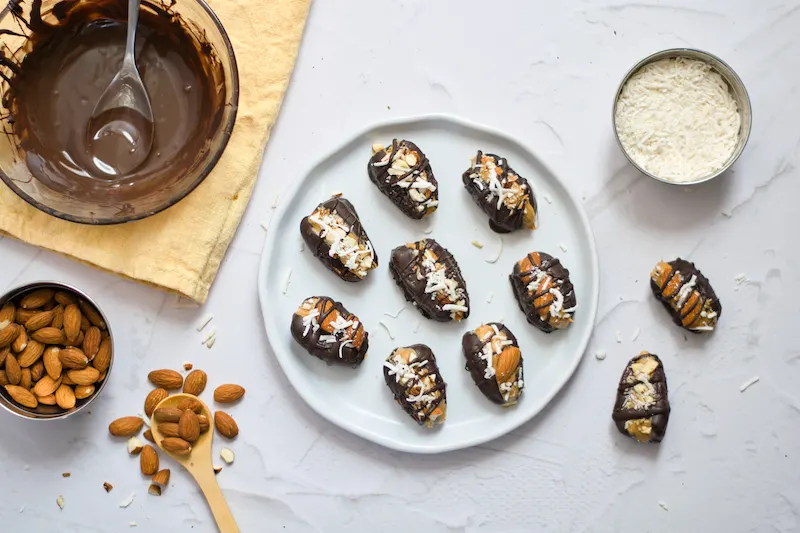
Stuffed Medjool Dates – An easy snack or dessert that you can prepare in advance and add to your table.
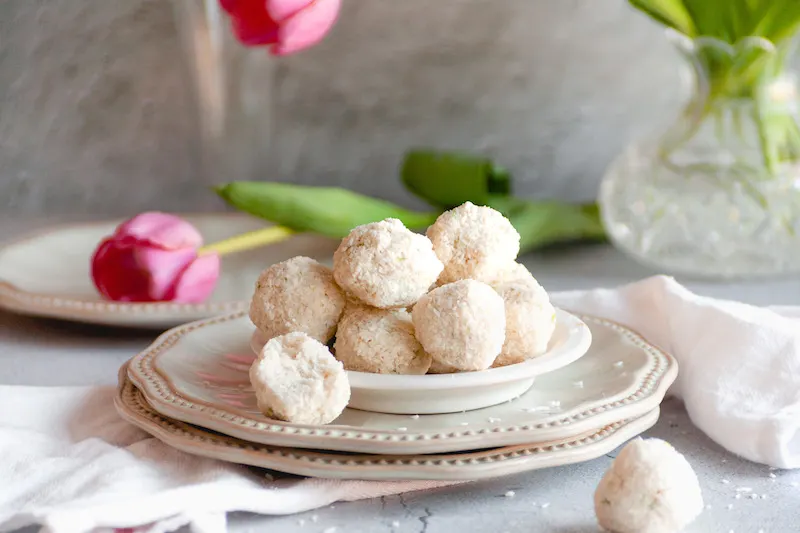
No Bake Coconut Mimouna Cookies – Whip up these vegan coconut cookies for your Mimouna table. Not only are they easy to make but taste delicious and can be made in advance.
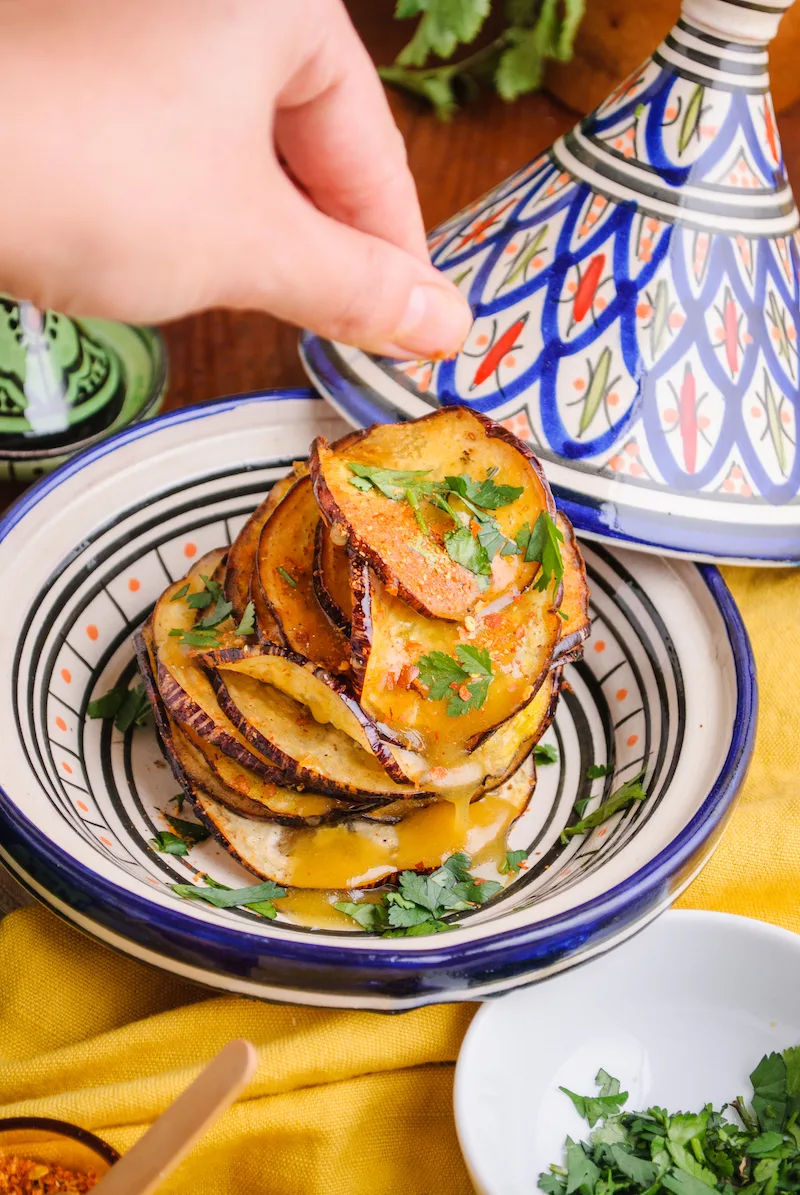
Fried Eggplant with Honey and Orange Blossom Water – I LOVED these eggplants when I first had them in southern Spain. But, they’re a little strange too right? Honey and eggplants? Just trust me they’re great and perfect for a celebration!
Candied Baby Eggplants – These candied eggplants are made in southern Spain and Morocco and are very delicious!
White Nougat (Zaban B’luz) – A delicious treat eaten year-round but especially for holiday celebrations.
More about the Mimouna Holiday
More background information about Mimouna if you want to learn more about the symbolism and specific items included.
Myriam S. Gabbay
Friday 17th of April 2020
Dear Amanda, Under the moufleta recipe you made the following comment: It’s celebrated immediately after Passover and while I don’t have proof I wonder if it wasn’t developed out of the tradition of Ramadan being followed by a feast day. Passover is also a time for sacrifice and having lived together for centuries it would make sense that there may be overlap.
Ramadan is a month of fasting so it makes sense to have a feast day after its completion. Passover is a holiday of many festive meals so it makes no sense to make yet another big meal when the holiday ends after eating big festive meals for eight days.
Also there is no direct connection between Ramadan and Passover. Ramadan can come out any month of the year as the Moslems use a solar calendar. Passover comes out only in the spring. So why didn't they do it after Succot or any of the other Jewish holidays?
Also, on Passover no sacrifice has been brought since the destruction of the 2nd temple which occurred in 68 c.e. The Passover rituals is in place of the sacrifice so we will not forget that we did once go to Jerusalem and bring the Passover sacrifice at the temple.
In addition the Jews of Kurdistan celebrate the same thing right after Passover but they call it Seharane, and it was celebrated for three days.
The common theme is of Maimuna and Seharane is the eating of leavened foods immediately after Passover ended when you cannot eat leavened foods. Moufleta eaten by the Moroccans and Kubeh eaten by the Kurdi Jews. The concept was to eat something leavened immediately after the holiday ends to show that we aren't adding/changing the law by extending the time not to eat unleavened foods. Some Moroccans also eat make and eat sfenj (donughts) at their Maimouna. I also saw a reference to Algerian Jews making and eating cous cous right after Passover.
Moshe
Monday 5th of April 2021
@Myriam S. Gabbay, We don't eat festive meals for all 8 days. The first two days of Pesach are for the seders, the rest of the holiday (besides Shabbat) we don't do anything. Pesach is not well known for its food. Everyone I know ends Pesach with a feast of carbs. What a weird comment.
Amanda Mouttaki
Friday 17th of April 2020
Hi Myriam - I'm very familiar with the holidays and connections. I merely offered speculation based off of many books and articles I have read about and from Moroccan Jews. Mimouna IS a festival celebrating the end of Passover. I never said there was a connection between Ramadan and Passover (not sure where you got that I did), I simply was again offering opinion based off of a lot of things I've read over the years.
Ali
Thursday 16th of April 2020
Thank you so much for these recipes. My Jewish Moroccan family are scattered all over the world, but most ended up in France and Israel. My mom is the only member of her family that moved to the U.S.A... so it is harder for us to hold on to her family's traditions. I am very grateful for these online recipes, especially the ones ones written in English!! I can't wait to try them out and ask mom if the flavors bring back memories of her home.
Amanda Mouttaki
Thursday 16th of April 2020
I'm glad that I could help! ;)
Sarah
Sunday 10th of January 2016
Hey Amanda! Chances are high that you will never find a Jewish community in Marrakech as the remaining Jews in Morocco live in Casablanca now. :) So, maybe you can look for a family over there? ;) Mimouna is indeed typical of the Moroccan community but has spread over to the entire Sephardic community now. I know Algerian and Tunisian families who do celebrate this holiday as well. the two most typical leavened foods eaten during the Mimouna is sfendj and moufletta (very thin msemmen). Mmm... just talking about it makes me want to eat tons of it!
Amanda Mouttaki
Friday 15th of January 2016
Rumor has it there are some families outside of Marrakech but Casablanca is the best bet, you're right. One of these days I'll find some!
Shoshana
Saturday 26th of September 2015
During the eight days of Passover, Jews have no bread or leavened foods in their homes. So, it became a custom that at the close of the holiday, Muslim neighbors visited Jewish homes, bringing gifts of sweet pancakes and other leavened products, which the Jews had not tasted in over a week, and had not yet had an chance to prepare. This is the Mimouna. In Israel, Mimouna has been adapted as a national holiday, celebrated on the day after Passover when Jews, Arabs and Druze gather outdoors to share their culinary traditions.
Maria Mouhtad
Wednesday 16th of April 2014
Hello / Assalamu Alaikum.
Thank you for the great ideas. I am Moroccan native of Casablanca and i have never heard of Mimouna. I like to read about it. I will try some of these great recipes.
Maria.
Ilda
Monday 18th of February 2019
Maria, I am shocked that as a native of Casablanca, you never heard of Mimouna. When did you leave morocco; where did you move to; were your parents moroccan jews or were you just born there? Just curious. Ilda